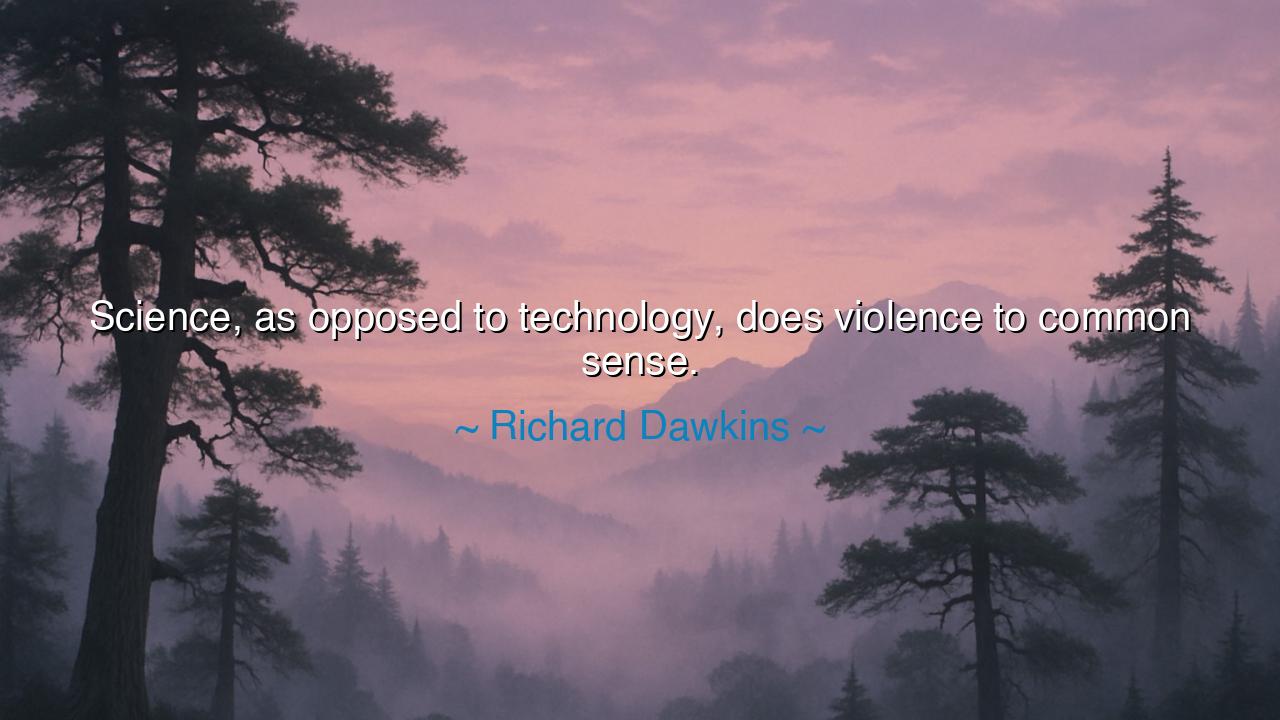
Science, as opposed to technology, does violence to common sense.






"Science, as opposed to technology, does violence to common sense." These words of Richard Dawkins invite us to reflect on the nature of science and its relationship with the world as we perceive it. Dawkins suggests that while technology is rooted in practical applications and often works in harmony with what we consider common sense, science challenges the very fabric of our intuitive understanding of the world. Science, in its quest to uncover truths, often reveals realities that defy our basic understanding of the natural world, pushing us to accept ideas and concepts that, at first, seem unnatural, strange, or even impossible.
In the ancient world, thinkers such as Plato and Aristotle grappled with the tension between reason and the perceived world. Plato, in his Allegory of the Cave, spoke of the painful journey from the shadows of ignorance to the light of knowledge—a journey that required breaking free from the comforting illusions of the senses and embracing the difficult truths revealed by philosophy and reason. Similarly, Aristotle’s pursuit of scientific knowledge often led him to conclusions that conflicted with popular beliefs. Science, even in the time of the ancients, was seen as a force that required mental courage, as it forced individuals to see the world as it truly was, not as it appeared to be through the lens of everyday perception. Dawkins echoes this ancient struggle in his assertion that science challenges common sense, urging us to confront ideas that may seem absurd but are, in fact, the key to deeper understanding.
Take, for instance, the discovery that the Earth is not the center of the universe, but rather, it orbits the Sun. The genius of Copernicus, and later Galileo, shattered centuries of belief in a geocentric cosmos, a belief so ingrained in the common understanding of the world that it seemed almost impossible to challenge. For many, the notion that the Earth was merely a planet revolving around the Sun was a direct assault on common sense. After all, the sky and the stars appeared to revolve around the Earth, and our senses told us this was the only possible reality. Science, however, did not cater to common sense; instead, it demanded the acceptance of evidence and the pursuit of truth, regardless of how difficult it was to reconcile with our everyday experience. In doing so, science revealed a reality that was far grander, yet far more humbling, than the one we had imagined.
This idea of science doing violence to common sense can be further illustrated by the theory of evolution, which Charles Darwin first proposed in the 19th century. The idea that humans share a common ancestor with apes was a concept so radically different from traditional beliefs about creation that it shocked society to its core. The violence done to common sense was not in the intention of Darwin, but in the revolutionary truth that he uncovered: that life on Earth had evolved through a process of natural selection, not divine intervention. This was a truth that contradicted the comforting simplicity of religious teachings and popular myths. The science revealed a picture of life on Earth that was far more complex and far more impermanent than the comforting creation myths many held to be true. And yet, the evidence was undeniable: science had uncovered a deeper, more accurate understanding of our place in the natural world.
In the modern world, quantum mechanics offers another example of how science seems to defy common sense. The notion that particles can exist in multiple places at once, or that their state is influenced by observation, is a far cry from the tangible, predictable world we experience in our daily lives. Quantum mechanics operates on principles that feel utterly unnatural, challenging our basic intuitions about the nature of reality itself. Yet, through the relentless pursuit of truth, science has uncovered these mind-bending realities, and they have proven to be accurate in ways that common sense cannot explain. The fact that science can reveal such complex, counterintuitive ideas speaks to its power and to its ability to go beyond the surface-level understanding of the world that our senses provide.
The lesson we must learn from Dawkins’s words is one of openness and humility. Science, in its purest form, does not seek to comfort us or validate our preconceptions. It seeks to reveal the truth, even when that truth is difficult, uncomfortable, or seemingly impossible. Our task, as seekers of knowledge, is to embrace the challenges that science presents to common sense. When science reveals truths that contradict our intuitive understanding of the world, we must not dismiss them as absurd, but examine them with an open mind and a willingness to expand our understanding. Just as Galileo did when he gazed through his telescope and saw the moons of Jupiter orbiting the planet, we must be willing to look beyond the surface of things and question what we think we know.
In our own lives, we must cultivate the courage to confront ideas that seem at odds with our common sense and to seek deeper understanding. Whether in the realm of science, philosophy, or society, we must resist the temptation to cling to easy answers and comfortable beliefs. Let us embrace the spirit of curiosity and reason, understanding that truth often lies in places where we least expect it. And in doing so, we honor the legacy of those who have come before us, those who dared to challenge common sense in their quest for knowledge, and whose discoveries continue to shape our world today. Science, like the explorers of old, leads us into uncharted territories—territories where common sense must sometimes give way to the extraordinary truths that await us.






AAdministratorAdministrator
Welcome, honored guests. Please leave a comment, we will respond soon